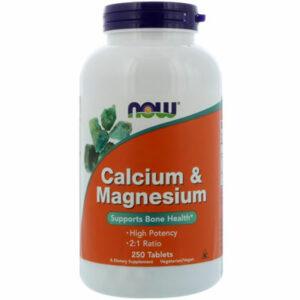Basic concepts of Calcium
Calcium is a mineral that is an essential component of bones and teeth.
The heart, nervous system, and blood clot also need Calcium to function properly.
In addition to the bones that often need Calcium to rebuild and maintain health, Calcium is usually stored and released when the body needs it.
Calcium is excreted from the body through sweating, skin, and other metabolic methods, and it gradually loses with age.
Especially for women, as their age decreases estrogen, the ability to absorb Calcium will decrease accordingly.
Different people will absorb Calcium differently because of race, gender, and age. In addition to strengthening bones and maintaining body function, Calcium has other uses including:
- Treat and prevent the lack of Calcium in the body, so as not to cause bone-related diseases, such as Osteoporosis, Rickets, Osteomalacia.
- Prevent or reduce the occurrence of Premenstrual syndrome.
- Prevent cramps and cramps that are prone to happen when the thigh is pregnant.
- Prevent pregnancy hypertension (or pre-eclampsia).
- Reduce the risk of colon cancer and rectal cancer.
- Prevent complications of bowel bypass surgery, high blood pressure, high cholesterol, and Lyme disease.
- Reduce the body’s absorption of lead.
Precautions
Compared with the regulation of medicines, the regulation of nutritional supplements is less strict, and more research may be needed to prove its safety.
Therefore, please obtain the doctor’s advice before use, and ensure that the benefits outweigh the risks. Please inform the physician before using Calcium if:
- Are pregnant or breastfeeding.
- Are taking other medicines, including any medicines that can be obtained without a prescription.
- Has been allergic to related medicines or herbs like Calcium.
- Suffering from any disease, symptom, or discomfort.
- Have a history of allergies, such as allergies to food, dyes, preservatives, animals.
Is it safe to use Calcium?
For most people, it is safe to take Calcium by mouth and intravenously as long as it does not exceed the recommended dosage. Other ethnic groups that require special attention are as follows:
During pregnancy and breastfeeding: It is safe to take orally within the recommended dosage, but there is not enough research to prove whether it is safe to use Calcium intravenously.
Patients with stomach acid deficiency: People with low stomach acid will not absorb well if they take Calcium on an empty stomach. Therefore, it is recommended that patients with a gastric acid deficiency (Achlorhydria) take Calcium supplements together with food.
Patients with hyperphosphatemia: people whose blood phosphate concentration is too high (Hyperphosphatemia) or too low (Hypophosphatemia), taking too much Calcium will destroy the balance of Calcium and phosphate in the body, which may cause harm.
Hypothyroidism: Calcium can hinder patients with hypothyroidism (Hypothyroidism) from receiving thyroxine replacement therapy. Therefore, the time between Calcium and thyroid medication needs to be at least 4 hours apart.
People with high calcium concentration in the blood: If you have parathyroid disease or Sarcoidosis, please do not take Calcium.
Poor renal function: Calcium supplements can cause excessive Calcium in the blood.
Smokers: People who smoke have a weaker ability to absorb Calcium in their stomachs.
What are the side effects of calcium?
Calcium can sometimes cause minor side effects, such as belching or flatulence. Side effects may not only be these, but not everyone will experience, if you have any doubts, please consult a doctor.
Calcium’s potential interactions
May interact with other symptoms or medications being taken. These possible medications include:
Ceftriaxone
Simultaneous injection of Sitalia and Calcium from the vein will endanger the lungs, kidneys and even life, so please do not inject Calcium again within 48 hours after the injection of Sitria.
Antibiotic
Calcium may reduce the body’s ability to absorb antibiotics, so please take Calcium at least 1 hour after taking antibiotics. Antibiotics that may interact with Calcium are Ciprofloxacin, Enoxacin, Norfloxacin, Chibroxin, Noroxin, Sparfloxacin, Zagam, Trovafloxacin, Trovan.
Tetracycline is also an antibiotic. Please take Calcium 2 hours before or 4 hours after taking tetracycline.
Drugs containing tetracycline include Demeclocycline, Declomycin, Minocycline, Minocin, Achromycin, etc.
Bisphosphonates
Calcium will reduce the body’s absorption of Bisphosphonates acid, so please take bisphosphonate at least 30 minutes before taking Calcium, or a little longer after taking it.
Such drugs include Alendronate, Fosamax, Etidronate, Didronel, Risedronate, Actonel, Tiludronate, Skelid, etc.
Calcipotriene
This is a drug similar to vitamin D, which can help the body absorb Calcium, so taking it with Calcium may cause the body to have too much Calcium.
Heart medicine
Calcium can affect the human heart. Taking this type of medicine at the same time may be harmful to the heart or affect the effect of the medicine.
Such drugs include Digoxin, Diltiazem, Cardizem, Dilacor, Tiazac, Verapamil.
Levothyroxine
L-thyroxine is a medicine used to treat thyroxine deficiency, and Calcium will reduce the body’s absorption of this medicine, so the two should be taken at least 4 hours apart.
Drugs containing levothyroxine include Armour Thyroid, Eltroxin, Estre, Euthyrox, Levo-T, Levothroid, Levoxyl, Synthroid, Unithroid, etc.
Sotalol
This is an anti-adrenaline medicine, Calcium will reduce the body’s ability to absorb it, so at least 2 hours before taking this medicine, or 4 hours after taking Calcium.
Diuretics
Some diuretics can increase the concentration of Calcium in the body. If taken together with a high dose of Calcium, it may cause too much Calcium in the body, causing kidney problems.
Diuretic drugs include Chlorothiazide, Diuril, Hydrochlorothiazide, Hydrodiuril, Esidrix, Indapamide, Lozol, Metrolazone, Zaroxolyn, Chlorthalidone, Hygroton.
Estrogen
Estrogen helps Calcium absorption. If taken together with high-dose Calcium, it may cause too much calcium in the body. Estrogen drugs include Conjugated equine estrogen, Premarin, Ethinyl estradiol, Estradiol, etc. extracted from the urine of pregnant mares.
Calcium ion channel blocker
This drug for treating high blood pressure will affect the concentration of Calcium in the body. If Calcium is injected intravenously, it may reduce the efficacy of such drugs, including Nifedipine, Adalat, Procardia, Verapamil, Calan, Verelan, Diltiazem, Cardizem, Isradipine, Felodipine, Amlodipine, et al.
Calcium recommended dosage
The following information is not a substitute for medical diagnosis. Please consult a physician before using Calcium related products.
The dosage of Calcium will vary according to age, health, and other conditions, and the use is not completely without risks, so please ask your doctor or herbalist about the appropriate dosage before taking it.
Calcium general dosage
The two most common types of Calcium are Calcium Carbonate (Calcium Carbonate) and Calcium Citric Acid.
In order to improve the body’s absorption capacity, Calcium supplements are usually recommended to be taken twice a day, and it is best to take 500 mg or less each time and take it with food.
1 cup of milk, or 1 cup of orange juice with Calcium added, contains about 300 mg of Calcium. The total amount of Calcium that adults ingest daily from diet and supplements should not exceed 1000 to 1300 mg, otherwise, there is a risk of high heart disease.
The amount required for children and the elderly will also be different, please consult a physician to know the appropriate amount.
The following is the recommended dosage of Calcium for the treatment and prevention of diseases and symptoms:
Prevent Calcium concentration from being too low
Take 1 gram of Calcium ion (Elemental calcium) every day.
Treat heartburn
Take 0.5 to 1.5 grams of Calcium carbonate antacid when needed.
Reducing phosphate in adult patients with chronic renal failure
Take Calcium acetate with each meal at an initial dose of 1.334 grams (or Calcium ion 338 mg), and if necessary, increase to 2.67 grams (or Calcium ion 500-680 mg) per meal.
Prevention of Osteoporosis
daily intake of Calcium ions from food or supplements, 1 to 1.6 grams. For women over 40 years old and in the premenopausal period, the dosage is 1 g.
If the medicine reduces the discomfort before menstruation, you can also take 1~1.2 grams of Calcium in the form of Calcium Carbonate every day.
Pregnant women
If the intake of Calcium in the diet is insufficient, in order to strengthen the bone density of the fetus, you can take 300-1300 mg of Calcium every day from the 20th to 22nd week of pregnancy.
Reduce thyroxine in patients with kidney failure: Please take 2~21 grams of Calcium carbonate.
Preventing bone loss caused by taking corticosteroids
taking Calcium ions in divided doses every day for a total dose of 1 g.
Patients with hypertension
Calcium intake is 1 to 1.5 grams per day.
Prevention and prevention of pregnancy-induced hypertension (or preeclampsia)
Take 1-2 grams of Calcium ion every day in the form of Calcium carbonate.
Prevention of Colorectal Cancer and recurrent benign tumor (or adenoma)
Take 1200 to 1600 mg of Calcium daily.
Patients with high cholesterol
In addition to those who are on a low-fat diet, or those who are restricted in calorie intake, they can take 1200 mg of Calcium per day, and can additionally take 400 international units (IU) of vitamin D.
To prevent fluoride poisoning in children: take 125 mg of Calcium twice a day and take it with vitamin C and vitamin D.
Weight loss
If you want to increase the amount of Calcium absorbed from dairy products in order to lose weight, the total daily intake of Calcium should be 500-2400 mg, combined with a calorie-restricted diet.
Calcium’s finished product type
- capsule
- liquid
Where can I buy the best Calcium supplements?
In recent years, food safety problems in various countries have exploded, and it is not healthy but black-hearted products that everyone spends on. Therefore, European and American products with relatively strict quality control have become popular products.
And iHerb.com is a large-scale medical cosmetics e-commerce company in the United States. It has a high satisfaction rate of 97% in the evaluation of Google customers. It provides global home delivery so that you can buy it without risking buying fakes through purchasing high-quality health products.

